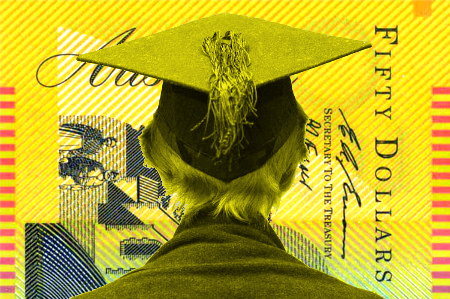Federal fee shift to see reduced students paying more
 Higher education changes mean students will now have to pay interest on their HELP loans, start repayments at a lower wage, and universities have had their cap on tuition fees lifted.
Higher education changes mean students will now have to pay interest on their HELP loans, start repayments at a lower wage, and universities have had their cap on tuition fees lifted.
The moves mean many universities will be able to generate significantly more funds for their own research and facilities, but they have been coupled with reduced federal funding and broad student outrage.
The National Union of Students has called the move to higher fees a “body blow for fairness”.
But Australia’s universities seem at odds with the changes, most welcoming the newfound freedom but regional universities in particular saying it may leave them worse off.
The chair of the Group of Eight and the Vice Chancellor of the Australian National University, Ian Young, says higher education costs will rise by close to a third in order to make up for reductions in federal government funding.
The federal budget outlines plans to reduce the amount of money the government pays universities by an average of 20 per cent for each course, while also increasing the indexation on higher education loan debts.
Writing on the ANU blog, Professor Young said “universities will need to increase fees by 30 per cent, on average, just to cover the lost funding”.
The National Tertiary Education Union has calculated that several leading universities will begin charging more than $100,000 for law and medical degrees, when the changes come into effect in 2016.
University of WA vice-chancellor Paul Johnson has told The West Australian that the changes were overdue.
“Providing greater autonomy will open up new opportunities for universities and deliver greater choice to students,” he said.
“We need to be able to better compete with the best universities around the world so we can undertake high impact research, attract the top students and produce leading graduates and attract the best academics.
“This can't happen under a highly regulated system.”
Similar sentiments from Murdoch University Provost Professor Ann Capling, but she says it will have to be a fine line to avoid discouraging prospective students.
“The decrease of Commonwealth contributions towards tuition fees in many areas of study - including engineering, agriculture, social sciences and visual and performing arts - will lead to much higher fees for many students,” she told the same publication.
“Many university students are already under considerable financial pressure and the increase in the student share of tuition fees will make it even more difficult for many students. If this becomes a deterrent to university study, the nation may be poorer for it.”
Regional universities are slightly less buoyant about the adjustments and reform.
The Regional Universities Network (RUN) has welcomed the notion, especially compared to the rumoured changes before budget night.
“We are particularly pleased that the government has decided to keep the demand-driven system for bachelor places and extended it to sub-bachelor places,” RUN chairperson Professor Peter Lee told the Warrnambool Standard.
“This will assist in providing pathways and lift participation in higher education in regional Australia for less well-prepared students.
“We are also pleased the government has chosen not to lower the Higher Education Loan Repayment threshold to the minimum wage, as recommended by the Commission of Audit. This will ensure that most students in part-time work won’t have to repay the debt while studying.”
Charles Sturt University Vice-chancellor and president Professor Andrew Vann says uncapped fees will make courses like agricultural science less attractive, while the sector already struggle with a lack of graduates.
“On the previous projections, in 2016 the student debt for agriculture would have been $27,000. It's now going to be $40,000,” he told the ABC.
“That's a very substantial increase in a profession which is struggling to attract students and in which the starting salaries are, frankly, not that fantastic.
“Environmental studies appears to be the standout with a 114 per cent increase in student contributions, so a more than doubling of debt for those students.
“It looks like 80 per cent of our students would be negatively affected.
“So I guess what we're really concerned about and we're looking to work through are perverse outcomes, in terms of actually switching students off disciplines that are very important for the future of the country.”
Spokespeople for a number of regional universities say they want more detail than has been provided so far, before they can judge the future impacts of the reforms.







 Print
Print